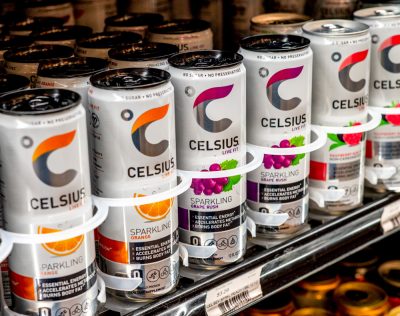Energy drink company Celsius was sued last year in a class-action lawsuit for alleged use of preservatives in its products. The popular beverage may have unsafe ingredients according to Judy Platt, director of Boston University’s Student Health Services.

before Nov. 23, 2022 may qualify for up to $250. KEVIN NGUYEN/DFP STAFF
“The energy drink industry is growing and these drinks are very popular among teens and adults,” Platt wrote in an email. “With anything we put into our bodies, it’s helpful to understand what it is that we are actually consuming and research published last year in the Journal of the American Heart Association warns that there is little known about the safety of certain ingredients.”
As a result of the case settlement, customers who purchased Celsius before November 23 can submit a claim to earn up to $250 until Feb. 13. If customers do not have receipts of their purchases they can earn up to $20.
Evan Brown, a senior in the College of Communication, said that she discovered she could earn money back from Celsius through TikTok and submitted a claim.
Brown said that she is not concerned that Celsius products contain citric acid, a compound sometimes used as a preservative.
“The sad reality of the American diet is just the fact that so much stuff already has preservatives,” Brown said.
According to the Celsius website, Celsius is a sugar-free, vegan alternative to other energy drinks, containing vitamin B and green tea extract. One can of Celsius contains 200 mg of caffeine.
Clare Whitney, a nutritionist at BU’s Sargent Choice Nutrition Center, wrote in an email that students should limit their daily caffeine intake to less than 400 mg per FDA guidelines. Whitney wrote that although caffeine stimulates the central nervous system, it does not provide energy, which “can only come from calorie containing foods.”
“Overall, students may benefit from assessing their overall dietary intake and sleep hygiene to improve energy throughout the day,” Whitney wrote. “When consumed in moderation, naturally occurring sources of caffeine such as coffee, tea and chocolate are likely safer alternatives to energy drinks.”
BU City Convenience stores on campus sell energy drinks, including Celsius.
Mel Rodriguez, a senior in the College of Arts and Sciences and a cashier at BU’s City Convenience in Warren towers said that energy drinks are very popular with BU students.
“When it’s exam season, I see people coming in multiple times a night buying a Celsius, buying a Redbull, any of those kinds of drinks,” she said. “Recently, we got packs of Celsius and people have been buying those packs.”
Rodriguez said that, on average, about 25-50 people purchase packs of Celsius drinks during her 5-hour shift.
“It’s not even exam season, and people are already buying packs of these drinks,” Rodriguez said.
Patricio Rodriguez, a sophomore in the College of Arts and Sciences who regularly drinks Celsius, said that he likes Celsius because it’s “clean.”
“I guess [Celsius] lets me focus,” Rodriguez said, “I don’t feel like I ever have a crash after drinking it, thankfully, and it’s because there’s no actual sugar in it.”
Although Celsius is sugar-free, it contains the artificial sweetener sucralose. According to Whitney, low-calorie energy drinks that contain artificial sweeteners are not always healthier than energy drinks containing sugar.
“No calorie sweeteners reduce the amount of calories consumed from the beverage, but do not make it more health promoting,” Whitney wrote. “Consumption of artificial sweeteners on long term health is not well established, and additionally may cause [gastrointestinal] upset in the short term.”
























































































































Marcos Oyler • Feb 13, 2023 at 9:46 pm
Energy drinks may be bad but we need to stop the artificial sweeteners fear mongering while sugary drinks are contributing to the obesity epidemic. Artificial sweeteners are much much healthier than sugar people hear artificial and lose their minds.